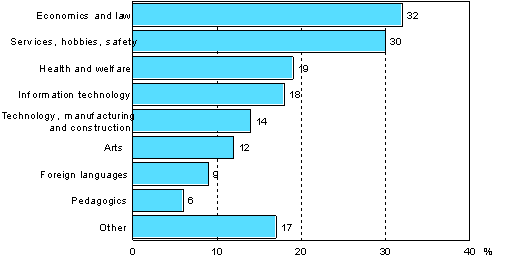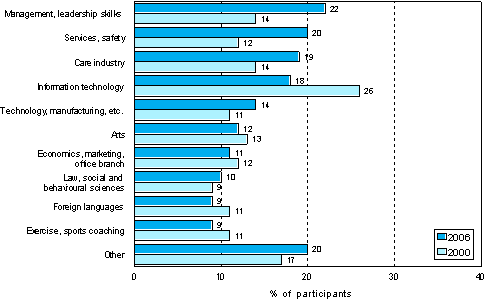3. Contents of adult education and training
Clearly the most common subjects of adult education and training in 2006 were associated with the fields of economics and law as well as services, hobbies and safety (Figure 6). Roughly one-third of the 18 to 64-year-old participants in adult education and training had received education and training on these subjects. Nearly one-fifth had participated in education and training in the field of health and welfare as well as information technology. Slightly fewer than every sixth 18 to 64-year-old person who received education and training in 2006 participated in education and training on technology, manufacturing and construction.
The two key course entities in the class Economics and law were working life training (33 per cent of the courses) and management and administration (27 per cent of the courses). The class including services, hobbies and safety consists primarily of courses dealing with occupational safety and safety at work (29 per cent of the courses) as well as sports and exercise courses (28 per cent of the courses). The field of safety in general as well as education and training in the field of transport were important contents in this class (both with shares of around 10 per cent of the courses). The classification of the contents of education in the 2006 Adult Education Survey is based on the classification (Fields of Education and Training, 1999) of the Statistical Office of the European Communities (Eurostat) which differs somewhat from the classification used in the 2000 Adult Education Survey.
Figure 6. Contents of adult education and training in 2006 (population aged 18–64 who participated in adult education and training)

NB! Summing up the proportions does not give 100 per cent as the result, as the same participant was counted as many times as he/she had participated in education on different fields
In order to compare the contents of the adult education and training received in 2000 and 2006, the classification of fields of education and training has been adjusted to correspond to the 2000 classification. Education and training related to management and leadership skills (which in the 2006 classification is part of business economics), education and training related to services and safety as well as that related to the care industry have increased from the year 2000 to the year 2006 (Figure 7). At the beginning of the millennium, 12–14 per cent of the recipients of education and training studied these subjects, but in 2006 the corresponding percentages had risen to 19–22 per cent. By contrast, studies in the field of information technology have decreased markedly. In 2000 more than every fourth 18 to 64-year-old participant in adult education and training had studied information technology, whereas in 2006 they amounted to only 18 per cent.
Figure 7. Contents of adult education and training in 2000 and 2006 (population aged 18–64 who participated in adult education and training, classification of contents of education from the year 2000)

NB! Summing up the proportions does not give 100 per cent as the result, as the same participant was counted as many times as he/she had participated in education on different fields.
Source: Adult Education Survey 2006, Statistics FinlandAikuiskoulutustutkimus 2006, Tilastokeskus
Inquiries: Kirsti Pohjanpää (09) 1734 2604, Helena Niemi (09) 1734 2488, Timo Ruuskanen (09) 1734 3620
Director in charge: Riitta Harala
Updated 31.12.2008
Official Statistics of Finland (OSF):
Participation in adult education [e-publication].
ISSN=2489-6926. Duration and content of education and training 2006,
3. Contents of adult education and training
. Helsinki: Statistics Finland [referred: 28.2.2026].
Access method: http://stat.fi/til/aku/2006/02/aku_2006_02_2008-12-31_kat_003_en.html

